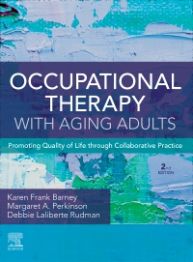Occupational Therapy with Aging Adults - E-Book, 2nd Edition
Get all the information you need to work holistically, creatively, and collaboratively when providing services for older adults with Karen Frank Barney, Margaret A. Perkinson, and Debbie Laliberte Rudman’s Occupational Therapy with Aging Adults, 2nd Edition. Emphasizing evidence-based, occupation-based practice and a collaborative, interdisciplinary approach, this text walks students and practitioners through the full range of gerontological occupational therapy practice, inclusive of working with individual clients to working at systems and societal levels. Over 80 leaders in their respective topical areas contributed to the book’s 33 chapters, including the conceptual foundations and principles of gerontological occupational therapy, bio-psychosocial age-related changes, environmental forces shaping occupational participation for older adults, the continuum of health care as well as implications for communities, and the attributes, ethical responsibilities, and roles involved in gerontological occupational therapy. This edition also covers topical OT issues that are crucially important to an aging population — such as diversity and inclusion, disability and aging, sexuality, technology, telehealth and virtual environments, intergenerational connections, updates on dementia research and caring for someone with dementia, occupational justice and aging, age inclusive communities, and an expanded section on hearing — to ensure your students are well versed in every aspect of this key practice area.
Get all the information you need to work holistically, creatively, and collaboratively when providing services for older adults with Karen Frank Barney, Margaret A. Perkinson, and Debbie Laliberte Rudman’s Occupational Therapy with Aging Adults, 2nd Edition. Emphasizing evidence-based, occupation-based practice and a collaborative, interdisciplinary approach, this text walks students and practitioners through the full range of gerontological occupational therapy practice, inclusive of working with individual clients to working at systems and societal levels. Over 80 leaders in their respective topical areas contributed to the book’s 33 chapters, including the conceptual foundations and principles of gerontological occupational therapy, bio-psychosocial age-related changes, environmental forces shaping occupational participation for older adults, the continuum of health care as well as implications for communities, and the attributes, ethical responsibilities, and roles involved in gerontological occupational therapy. This edition also covers topical OT issues that are crucially important to an aging population — such as diversity and inclusion, disability and aging, sexuality, technology, telehealth and virtual environments, intergenerational connections, updates on dementia research and caring for someone with dementia, occupational justice and aging, age inclusive communities, and an expanded section on hearing — to ensure your students are well versed in every aspect of this key practice area.
New to this edition
- NEW! Chapters address the key topics of Aging Disgracefully: Perspectives on Disability Experience and Activism from Disability Studies and Anthropology; Humanities and the Arts in Later Life; The Role of Occupational Therapy in Primary Care; and Creating Age-Inclusive Communities.
- NEW! eBook version is included with print purchase that allows access to all the text, figures, and references, with the ability to search, customize content, make notes and highlights, and have content read aloud.
- NEW and UPDATED! Content explores diversity and inclusion, sexuality and aging, technology, telehealth and virtual environments, recent research on driving in later life, occupation and social transformation, intergenerational connections, caring for someone with dementia, occupational justice and aging, hearing, and arts and humanities.
- Updated references ensure content is current and applicable to today’s practice.
Key Features
- UNIQUE! Intraprofessional and interprofessional approach to intervention emphasizes working holistically and collaboratively in serving older adults.
- UNIQUE! Chapter on the wide range of physiological, musculoskeletal, and neurological changes among the aging patient population highlights related occupational performance issues.
- Case examples help you learn to apply new information to actual client and community situations.
- Chapter on evidence-based practice discusses how to incorporate evidence into clinical or community settings.
- Questions at the end of each chapter can be used for discussion or other learning applications.
- UNIQUE! Chapters on nutrition, food insecurity, and oral health explore related challenges faced by older adults.
- Chapter on ethics provides a deeper understanding of how to address challenging ethical dilemmas.
Author Information


